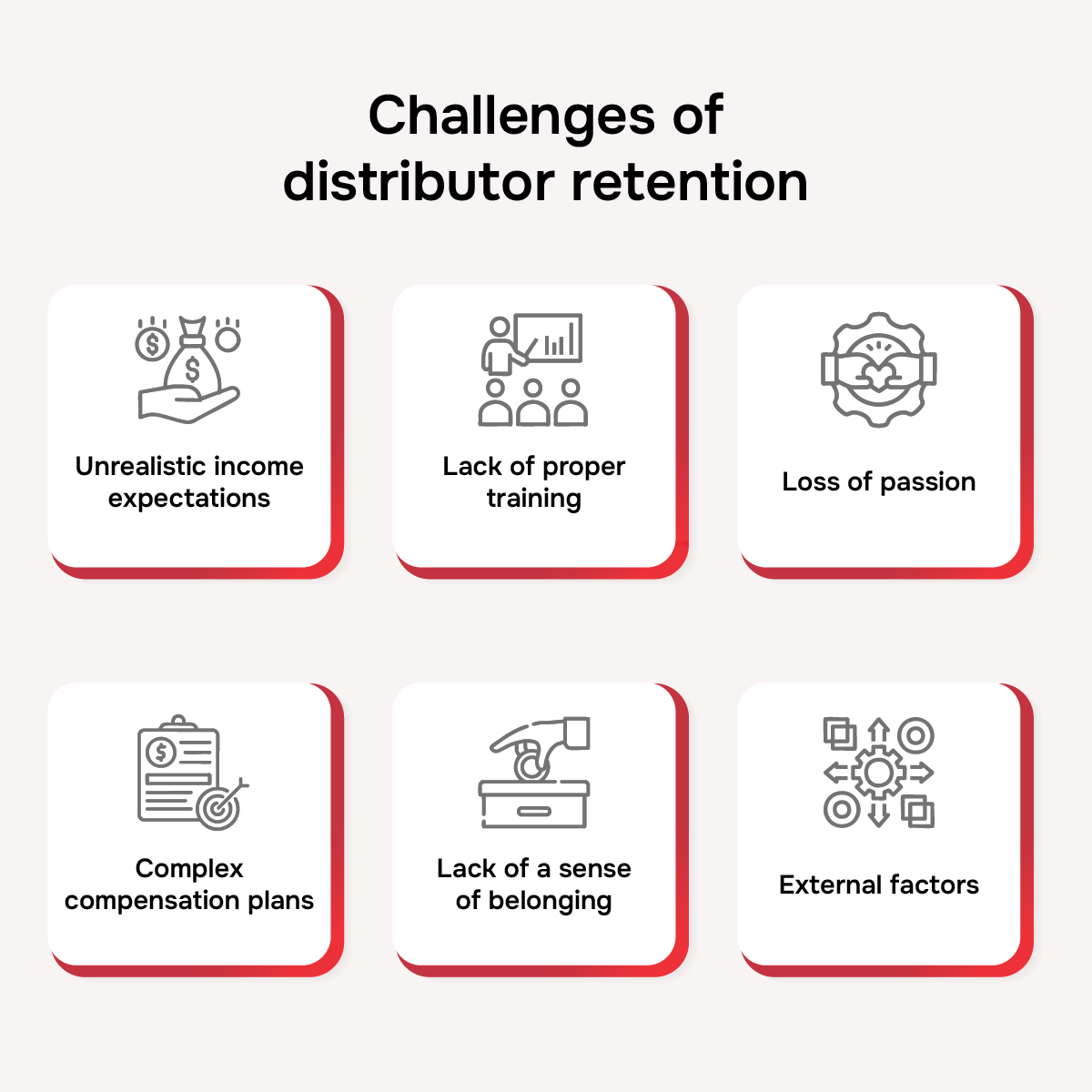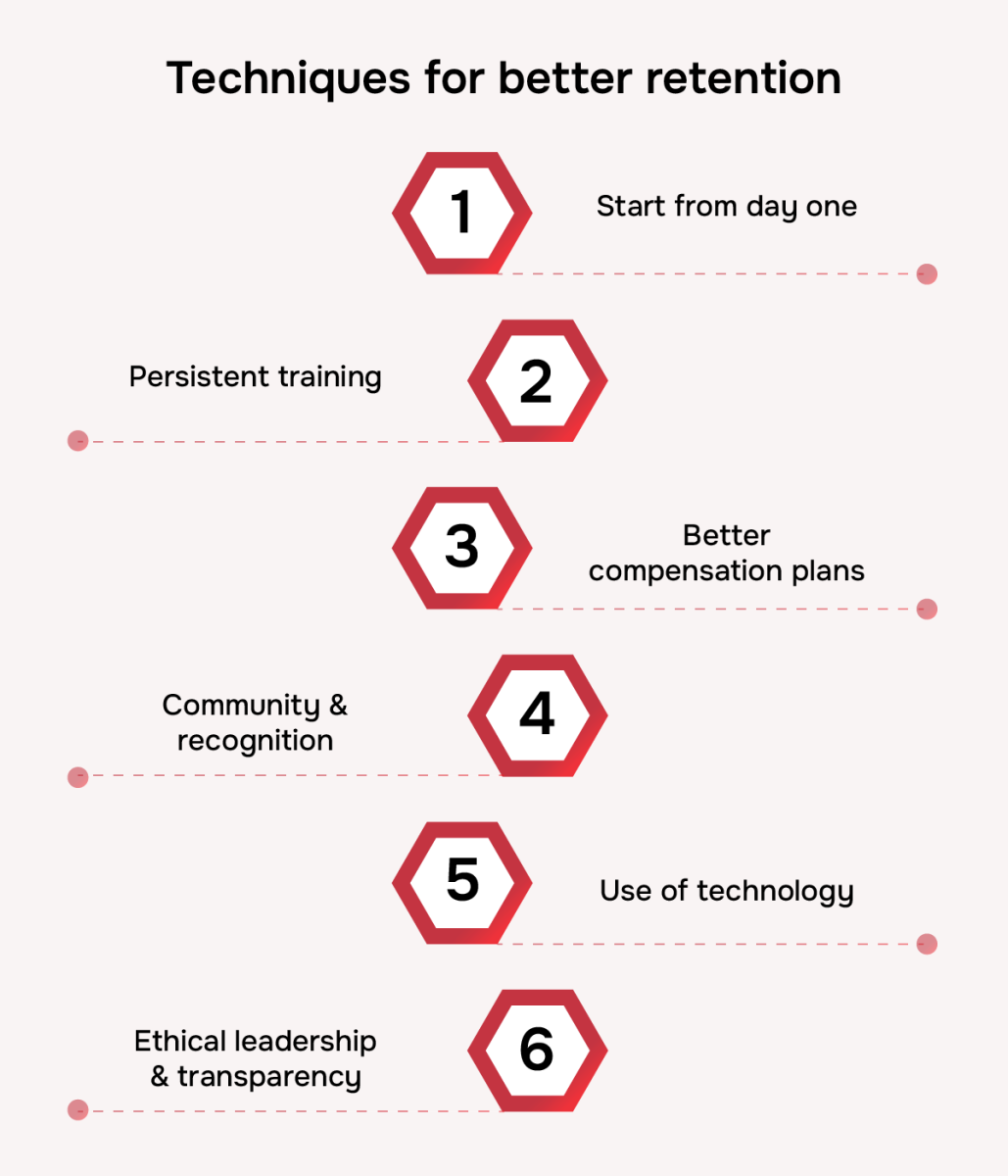Successful MLM businesses demonstrate their achievement through proper distributor commitment. However, higher distributor turnover levels act as the main problem confronting the MLM business sector today. The MLM industry faces difficulties in maintaining steady sales teams due to consistent change in its distributor network since its initial operation.
According to statistics, the number of direct sales personnel across the world continues to increase while exceeding 124 million distributors. But despite these big numbers, many companies still struggle to retain their salespeople.
The Direct Selling Association reveals that United States direct selling businesses only keep approximately 20% of their distributors.
Why does this happen? Are there any measures available to prevent this type of occurrence? This article presents research-based models that prevent distributor turnover and the primary factors that push distributors to exit their positions.
Major challenges of distributor retention
To solve the problem, the most important thing to understand is the reason why distributors quit. Surveys and research show various obstacles, which lead multi-level marketing distributors to quit the business in large numbers.

Unrealistic expectations and no initial success
When MLM members have unrealistic expectations regarding their profits but feel like they are being unmet, they often abandon the opportunity. A few newcomers join the industry based on promises of easy financial gain and swift success through exaggerated statements they hear. American direct selling distributors earn an average of $5,200 yearly, but quickly having thousands of dollars is extremely challenging. When new recruits discover their earnings amount to less than their expected income, it creates disappointment in them.
Lack of proper training and support
The deficit of knowledge among new distributors leads to their quick failure as distributors. Research conducted with 500 previous MLM distributors revealed that 60% of them got insufficient training and operational support from their respective companies. The situation worsens because distributors who receive brief and ambiguous directions from their direct superior officers develop poor communication results.
Lack of motivation and passion
The majority of distributors, according to Journal of Direct Selling Research, join MLM for financial purposes and product offers. Yet the reasons they stay within the company are career development and company loyalty.
Distributors abandon their network marketing activities once the first phase of fascination ends because they lack significant outcomes from their participation. The assumptions that distributors have regarding company representations along with product quality standards directly affect their level of motivation. Finding out business mischaracterization or substandard product quality results in their loss of motivation.
Compensation plan frustrations
The company faces distributor attrition when employees find compensation plans complex as well as experience discrepancies in payment. If the path to generating income through network marketing becomes too complicated for distributors, they choose to leave the business. Complicated reward structures for representatives result in their experiences of confusion and distrust of the compensation process. The distributors need to understand success methods in clear ways. Business failure occurs because some distributors receive unrealistically difficult requirements for earning profits.
Lack of recognition or sense of belonging
Research shows that present-day generations intensely desire recognition because it determines their success in direct selling. The absence of acknowledgment toward distributorship efforts leads to decreased emotional involvement between distributors and the organization. Such distributors would depart because they receive no human companionship during the networking phase other than continued isolation.
Life changes and outside influences
The firm could also face a potential loss of customers, which is beyond their management capabilities. Individuals that obtain new employment positions or health-related problems often decide to leave their multi-level marketing opportunities. A small number of temporary members in the network program can increase the dropout rate despite having no plans to sustain a business indefinitely.
Data-driven retention techniques
There is good news, however. Direct sales organizations together with MLM businesses have implemented protective measures to prevent rising staff departures. These research-based techniques prove effective in improving distributor retention levels.

Retention begins on day one
Research establishes that thriving MLM businesses which maintain 50% employees deploy effective onboarding procedures (Harvard Business Review). Success during the first 14 days of distributorship creates an opportunity for continued employment with the company for six years. Leader engagement reaches peak performance through "Fast start" packages, which provide fast movement together with quick rewards and starter tools.
Continuous training and growth
The process of employee training does not need to stop after onboarding. Distributor confidence levels remain high along with low abandonment rates when the company conducts regular webinars and training sessions for its distributors. Research data demonstrates that inadequate training is the primary factor which leads distributors away from their positions. The leading MLM companies develop their distributors by teaching them management and motivational leadership skills, which creates long-term member loyalty.
Improved compensation plans
Straightforward pay policies keep the motivation of the distributor high. Members who get rewards early like "Rapid Rewards" within 24 hours have less likelihood of frustration. Pay systems should be designed by the company where payment is given to agents for team building and closing sales. Difficult compensation plans repel the distributors from the company so keeping simple plans and open communication is the key solution.
Community and recognition
Feeling appreciated boosts retention. When public recognition works together with team-building culture, which includes social events and incentive travel programs, the distributors become more loyal. Studies demonstrate that recognizing employees leads to better company retention rates, specifically affecting younger workers within the 30-under category.
Use of technology
Today's distributors expect online support. The system provides distributors access to mobile-friendly automated mentoring systems through eLearning websites. Gamification (badges, challenges) boosts motivation. Data analytics generates disengagement predictions that allow businesses to take preemptive action with distributors at risk of leaving.
What sets effective technology apart from other forms? An elegantly designed distributor backoffice application in conjunction with a portal allows users to place orders as well as track sales data and commission revenue. This also helps in reviewing training material and exchanging messages with fellow team members from one platform.
The business management system supported through smartphones enables distributors to embed business work seamlessly into their daily routines. This lets them handle essential activities while waiting between tasks. New representatives who start the job may choose to resign early if they encounter complex spreadsheets and multiple website requirements during their work process.
Ethical leadership and transparency
Trust in leadership matters. Clear earnings reporting and fair policies together with business practices of integrity result in longer distributor retention for organizations. When businesses ensure transparency and establish clear requirements, they defend against distributor loss originating from false understandings.
The time MLM companies invest to create efficient onboarding and MLM training strategies leads to better retention rates among distributors. The method will combine fair member compensation with enabling intra-member networking and ethical leadership approaches grounded in technology.
Case studies of successful businesses in the field
Some MLM companies have done a great job in effective distributor retention through thoughtful efforts, which we will see here.
SeneGence International
The skincare and cosmetics firm SeneGence International has strong distributor loyalty by virtue of the supportive culture within the firm. Their corporate culture that is like a family coupled with ongoing development opportunities for their salesforce is their key to business success. Joni Rogers-Kante established training programs at the firm, which provided distributors life coaching and balanced-living educational opportunities to develop themselves as whole people instead of sales focused individuals.
The company culture emerged as the exclusive factor that encouraged 30% of distributors to continue within the organization.
4Life
4Life Research based in Utah makes compensation plan changes to offer stronger benefits for their new distributors through their retention approach. The "Rapid Rewards" payment system of 25% commission delivery within 24 hours served as the newest venture for 4Life Research to attract candidates.
The company offered new recruits the satisfaction of receiving their first commission from their initial sale. The "Builder Bonus" system which was established by the company rewarded its representatives with added bonuses upon recruiting new members who advanced their position ranks substantially.
Xyngular
Xyngular introduced a course of action to share its full compensation program with potential recruits at their business page. Prospective members can view in the compensation disclosure that members earn less than $100 per month in average payments provided that 80% of members fall under this category.
Xyngular developed dual distribution opportunities, which allow distributors to maintain their retail clientele or construct organizational teams for earning commissions through team recruitment (or through a hybrid approach). Those joining Xyngular can participate at the level they want, which means occasional sellers don't have to recruit but relationship-builders can do so and earn quite well.
Herbalife
Herbalife Nutrition is among the largest MLM firms in the world. For one year, only 16% qualified under the active purchaser standard.
The organization has recently changed its operations to provide enhanced satisfaction to distributors. They separated discount buyers from business-building distributors, which allowed the company to provide tailored service levels accordingly. The training programs adapted by giving fresh representatives complete instructions on customer acquisition techniques along with product knowledge.
Mary Kay
Mary Kay Inc. maintains a large number of direct selling distributors because they demonstrate exceptional retention capabilities toward their consultants. Mary Kay established recognition and reward system at the foundation of its corporate strategy when it began operations as a business. The company provides performance-based recognition through its prize distribution of pink Cadillac cars and luxury travel packages with jewellery awards for best sales performers.
According to Inc. Magazine, Mary Kay Ash established recognition as a vital company element, which produced extraordinary loyalty among her sales team. The strong sisterhood atmosphere with positive attitudes at Mary Kay extended consultant loyalty towards the company. Any multi-level marketing company can sustain a strong distributor base through effective appreciation methods regardless of their ability to offer free car incentives like Mary Kay Cosmetics.
Company performance and distributor retention will show great improvement when organizations modify their traditional business practices. These strategic business methods adopted by MLM companies generate measurable outcomes that support organization expansion and maintain high field force motivation.
Discover how we build resilient businesses with advanced MLM functionalities
Key takeaways
Stable MLM growth relies on retaining distributors as the main component. The high distributor turnover rate generates negative effects that can damage both company performance and brand reputation. Below is a summary of important points obtained from the previous statistics and examples.
Invest in your distributors from the beginning
A proper strategy should guide the welcome phase. Organized support combined with immediate activities should form the basis of your welcome program while explaining relevant expectations to distributors.
Offer ongoing training and mentoring
The training provided during the first month of service must become a continuous program of development instead of acting as the final training stage. A continuous learning program established by the company aims to enhance distributor performance from beginning to end of their business period. The training program should progress from basic product information toward complex business models.
Review your compensation plan to optimize operations
Consistent announcements should describe how your payment systems endorse proper field conduct along with meeting all distributor requirements. New distributors should receive bonus incentives together with commission-based rewards to earn early compensation, thus reducing their initial dropout chances.
Develop a recognitive, inclusive culture
The distributor needs to understand that he or she functions as a central team member rather than remaining as an independent individual. Successful employee recognition programs must be integrated throughout all organizational levels. Thus, workers can experience both first-time achievement wins and ongoing recognition success instead of receiving most attention on privileged goals.
Modern tools
To decrease their daily workload, your sales representatives require modern technological solutions. The system needs an MLM back-end solution with analytics system, mobile capabilities and communication systems. Automated systems need to maintain distributor motivation through recall alerts as well as member-specialized communication platforms.
Lead with transparency
The establishment of customer trust demands honesty in all operations of business interaction. Companies should share true facts about business alterations together with rational performance data when communicating distributor performance standards. Make yourself available to listen carefully to distributor input while demonstrating genuine concern about their satisfaction levels.
Those who trust their leaders follow their choices without question even when business growth is unequal, or new market competitors emerge. Companies with ethical reputations will achieve better hiring of dedicated candidates who can be retained more easily. All evidence points to the fact that direct selling organizations must select these retention methods over other recruiting methods since this approach drives market performance.









Leave your comment
Fill up and remark your valuable comment.